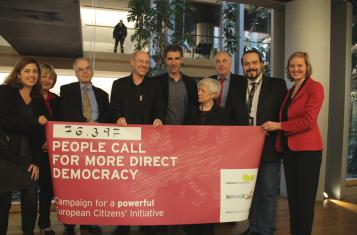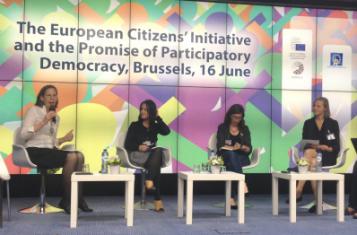I write to you from California, where I am reading – with all the bemusement with which we Americans consume the European news – about the Mum, Dad and Kids ECI. This very same citizens’ initiative – which defines marriage and family by excluding same-sex marriages – is very familiar; Americans have voted dozens of times on such measures. And somehow our union endures.
European Commission hysterical about “emotionally charged” ECIs
I was surprised then to read that the European Commission has balked – not just at this measure, but also at the whole idea of the European Citizens’ Initiative. Members of the Commission expressed concern that ECIs were being used for “emotionally charged” topics that would “generate Euroskepticism” and said perhaps the new initiative process should be used only for topics that “move the European project forward.” The Commission members have been discussing how to limit the power of this tool, the only democratic tool by which citizens can directly influence the EU policy agenda.
The Commission is not merely hysterical. It’s foolish. An ECI like this is not to be feared – it’s to be embraced. Especially by those people who, like me, believe in marriage equality and the rights of same-sex couples. I can say this because I know a fundamental rule of direct democracy: the fastest way to win is by losing. Or to put it another way: the best opportunity to make progress through direct democracy is often when your views or positions are attacked by a citizens’ initiative. Time and again, campaigns against a certain interest or right produce debates that often allow for the expansion or protection of the rights that are attacked.
Californian experiences with citizens’ initiatives
As it happens, the best recent example of this dynamic is this very same issue: same sex-marriage. Two decades ago, the issue of marriage equality –that’s the preferred American phrase for the right of same-sex couples to marry – wasn’t a significant one on the American agenda. And when pollsters asked Americans about it, they overwhelmingly opposed marriage equality.
But Christian and family groups in the U.S. have made money and elected favored politicians by positioning themselves as defenders of the family. Conservative politicians have done the same. So, at the turn of the millennium, politicians and Christians groups began to put initiatives on ballots to prohibit same-sex marriage. The political strategy was to increase turnout of conservative and Christian voters; President George W. Bush used this strategy to win re-election in 2004, backing multiple ballot measure to ban same-sex marriage. Nearly all of these measures would win. Indeed, between 1998 and 2012, voters in 30 states – more than half of the 50 – would choose to define marriage as between “one male and one female.”
But all these victories helped produce a huge defeat on the fundamental issue. The campaigns for marriage equality raised the profile of the issue. Voters started to learn more about the question. Newspapers covered it. Groups in favor of marriage equality formed, and raised funds, and organized. And public opinion turned, rapidly, in favor of marriage equality. In 2008, Barack Obama opposed marriage equality as a candidate. In his 2012 re-election, he switched his views and endorsed it – and was accused of being too slow, because a majority of the American public supported same-sex marriage.
All those losses on initiatives produced wins. In 2015, the U.S. Supreme Court – which has a long history of following public opinion – declared that marriage equality was the law of the land. If the court hadn’t acted, direct democracy would have certainly been used to reverse the bans on same-sex marriage in the states.
Lessons for progress in European democracy
The shift on the issue is regarded as one of the fastest changes on a social issue in the history of the United States. Ballot measures like Mum, Dad, and Kids made it possible. The lesson for Europeans, and the Commission, is obvious. One of the best ways to move an issue forward is to allow people to consider it, and even to oppose it.
The Commission’s approach to the ECI is thus exactly backwards. It’s trying to block this ECI, and create new problems for the process. But the way to make more progress in the European project is not restrictions, but more open doors. Instead of hamstringing the process, open it up – so that more ECIs—including ones like this – can move forward.
Indeed, what’s needed is new infrastructure to make sure the debate produced by such initiatives is as big and attention-getting as possible. That means making sure more ECIs are registered, and that the Commission acts on those ECIs that are successful in gathering signatures.
ECIs are a huge opportunity to make the case for European integration
The ECI has been used by people who want to further European integration – on trade, wages, education and a host of other subjects. But the Commission would be wise to encourage ECIs that would seek to frustrate that integration as well. Yes, that’s right—by opposing measures that restrict Europe, the Commission would have a huge opportunity to make the case for greater European integration and advancing the European project.
That’s how democracy should work. It’s also good politics. Don’t be afraid of the debate that ECIs produce. Don’t try to push certain issues and ideas aside. Instead, embrace that debate, and use it to make progress. That, I might add, is how healthy marriages are supposed to work.
Joe Mathews is a board member of Democracy International and columnist & innovation editor at Zócalo Public Square. This piece was published first as a guest blog by EurActiv here.



